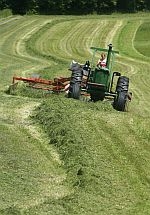 (Host) Vermont agriculture leaders say crops have been stunted this year by cool temperatures and relentless rain.
(Host) Vermont agriculture leaders say crops have been stunted this year by cool temperatures and relentless rain.
They say that nearly all crops are maturing much more slowly this year. And as VPR’s Ross Sneyd reports, that could make the dairy crisis even worse.
(Sneyd) You remember that old saying, that corn should be knee high by the Fourth of July?
Well, how about by the end of July?
Many cornfields are way behind this year. And Kelly Loftus at the Agriculture Agency says that’s one more strike against dairy farmers, who rely on field corn to feed their cows over the winter.
(Loftus) "The issue with the field corn is that the longer it takes to grow and harvest, the lower the quality. So there is potentially an issue, for that to be an issue for farmers down the road in terms of having to supplement their corn with feed that they have to purchase."
(Sneyd) Vermont already has lost more than 30 dairy farms this year because their incomes have been slashed in half.
Prices have fallen to around $12 for every hundred pounds, which is $6 or so less than what it costs to produce that milk.
Those costs continue to rise and this summer’s weather can only force them higher. Hay and haylage are important in the winter diets of dairy cows. The wet weather has made it difficult to get the hay in. And even when farmers can get it in the barn, the rain can tend to wash away some of its nutritional value.
Loftus says this is all a terrible combination for dairy farmers.
(Loftus) "It could be the final straw for another dairy farm in the state to go out of business with the way the milk pricing has been. So we’re just very concerned that any little issue has the potential to put a dairy farm over the edge."
(Sneyd) Long-term conditions aren’t quite so serious for produce and berry farmers. But it’s not been a very good year for them, either.
Sweet corn is late to mature this year and consumers might see it at their local farmers’ market as much as a month later than normal.
And gardeners across the state are beginning to see late blight. That’s a fungus that’s typically seen in Vermont late in the season and usually isn’t much of a threat.
This year, though, it’s come on early, it’s widespread, and it’s made worse by the weather.
Kelly Loftus says the virus already has been found in Newfane, Norwich and Plainfield, New Hampshire.
(Loftus) "It is our assumption that it is in more towns and it’s just a matter of time before we recognize it there. We do think it’s going to be a much more widespread problem than what’s being reported right now."
(Sneyd) All in all, it’s been a tough year to be a farmer – or even a gardener. Loftus says the only hope is for a quick turnaround in the weather.
For VPR News, I’m Ross Sneyd.